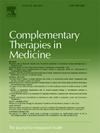间歇性禁食对超重和肥胖绝经后类风湿关节炎妇女的影响:一项随机对照临床试验
IF 3.5
3区 医学
Q1 INTEGRATIVE & COMPLEMENTARY MEDICINE
引用次数: 0
摘要
背景与目的类风湿关节炎(RA)是一类风湿性疾病,是一种影响患者关节和其他部位的自身免疫性疾病。间歇性禁食(IF)是一种对一些人群有益的饮食模式。这项随机对照试验(RCT)假设IF可以改善超重和肥胖绝经后RA患者的生活质量、临床症状、炎症和氧化应激。方法本研究采用对照、平行组优势设计,将44名超重和肥胖的绝经后RA妇女随机分配接受IF (n = 22)或常规饮食(n = 22),为期8周。干预组给予16/8 IF,对照组给予典型饮食,为期8周。主要观察指标为健康评估问卷-残疾指数(HAQ-DI)问卷得分。次要指标包括身体质量指数(BMI)和晨间关节僵硬度(MS),生化指标包括血清红细胞沉降率(ESR)、高敏c反应蛋白(hs-CRP)、总氧化剂和抗氧化能力(TOC和TAC)、氧化应激指数(OSI)和白细胞介素6 (IL-6)在基线和研究结束时进行评估。采用疾病活动性评分-28 (DAS-28)和临床疾病活动性指数(CDAI)评估疾病严重程度。结果IF饮食显著改善了BMI、DAS-28、CDAI和HAQ (p值均为0.05)。然而,对其他研究结果没有显著影响。结论if对RA患者的部分预后有有益影响,但对炎症和氧化应激指标无显著影响。需要更多的研究来确定IF对RA患者的影响。本文章由计算机程序翻译,如有差异,请以英文原文为准。
Effects of intermittent fasting diet in overweight and obese postmenopausal women with rheumatoid arthritis: A randomized controlled clinical trial
Background and objective
Rheumatoid arthritis (RA), in the category of rheumatic diseases, is an autoimmune illness that affects joints and other parts of suffered patients. Intermittent fasting (IF) is a dietary pattern that has had beneficial impacts on several populations. This randomized controlled trial (RCT) hypothesized that IF can improve quality of life, clinical symptoms, inflammation, and oxidative stress in overweight and obese postmenopausal women with RA.
Method
This study was a controlled, parallel-group superiority design in which 44 overweight and obese postmenopausal women with RA were randomly allocated to receive either IF (n = 22) or the usual diet (n = 22) for 8 weeks. The intervention group received 16/8 IF, and the control group received the typical diet for 8 weeks. The primary outcome was the Health Assessment Questionnaire-Disability Index (HAQ-DI) questionnaire score. The secondary outcomes included body mass index (BMI) and morning joint stiffness (MS) and biochemical indicators, including serum concentrations of erythrocyte sedimentation rate (ESR), high sensitive c-reactive protein (hs-CRP), and total oxidant and antioxidant capacity (TOC and TAC), and oxidative stress index (OSI), and interleukin 6 (IL-6) were assessed at the baseline and end of the study. Disease severity was assessed using the Disease Activity Score-28 (DAS-28) and Clinical Disease Activity Index (CDAI).
Results
The IF diet significantly improved BMI, DAS-28, CDAI, and HAQ (p-value<0.05 for all). However, there were no significant effects on the other study outcomes.
Conclusion
IF has beneficial effects on some outcomes related to RA patients, while it has no significant impact on inflammation and oxidative stress markers. More studies are needed to determine IF's effects on RA patients.
求助全文
通过发布文献求助,成功后即可免费获取论文全文。
去求助
来源期刊

Complementary therapies in medicine
医学-全科医学与补充医学
CiteScore
8.60
自引率
2.80%
发文量
101
审稿时长
112 days
期刊介绍:
Complementary Therapies in Medicine is an international, peer-reviewed journal that has considerable appeal to anyone who seeks objective and critical information on complementary therapies or who wishes to deepen their understanding of these approaches. It will be of particular interest to healthcare practitioners including family practitioners, complementary therapists, nurses, and physiotherapists; to academics including social scientists and CAM researchers; to healthcare managers; and to patients. Complementary Therapies in Medicine aims to publish valid, relevant and rigorous research and serious discussion articles with the main purpose of improving healthcare.
 求助内容:
求助内容: 应助结果提醒方式:
应助结果提醒方式:


